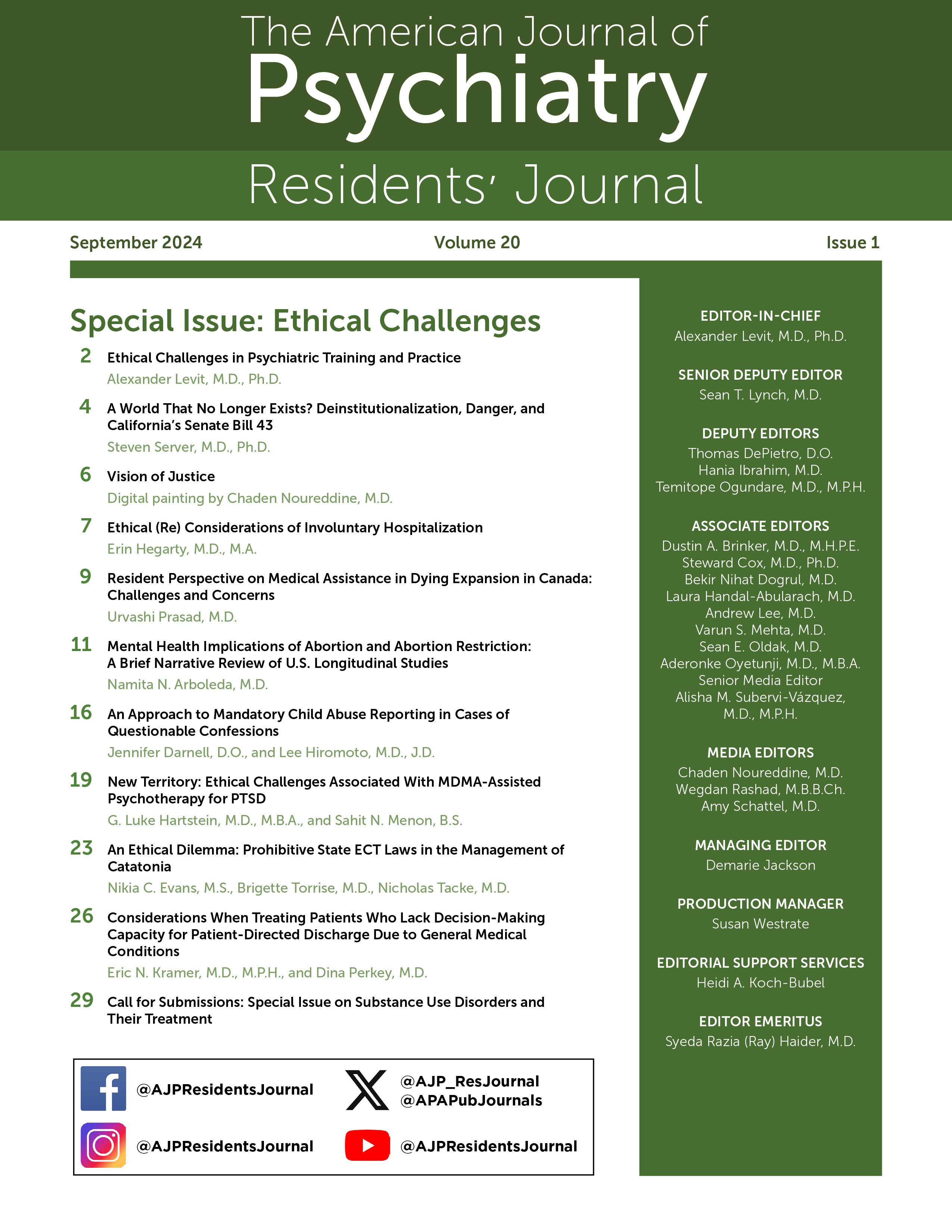Since its introduction in Canada in 2016, medical assistance in dying (MAiD) has been a controversial topic. What began initially as an option for euthanasia for individuals with a physical illness where death is naturally foreseeable has since expanded to include those with grievous and irremediable medical conditions where death may not be naturally foreseeable (
1). This expansion was a result of a ruling in the
Truchon (Jean Truchon who had cerebral palsy)
v. Canada case at the Superior Court of Quebec, which ruled that the eligibility criteria of “reasonable foreseeability of natural death” was unconstitutional. Particularly, the court ruled that it violates section 7 of the Canadian Charter, which protects against deprivations of life, liberty, and security of the person, and section 15, which guarantees the right to the equal protection and equal benefit of the law without discrimination (
2). Subsequently, the courts believed it would be discriminatory to exclude those with a primary mental illness from accessing MAiD. Thus, the MAiD expansion also included those with a primary mental illness, which was initially set to be available in Canada as of March 2024; however, it has been recently postponed to March 2027 to allow provinces and territories more time to prepare their health care systems and to allow more training for practitioners (
3). Not unexpectedly, the MAiD expansion brings to light several ethical dilemmas. Specifically, in this commentary, I hope to shed light on the challenges of determining the irremediability of a mental illness, distinguishing between MAiD requests and suicidality, and the impact of societal vulnerabilities on MAiD requests.
With regard to irremediability, there is currently no established standard of care that sets a threshold for when a mental illness should be considered irremediable (
4). The Expert Panel on MAiD and Mental Illness, which is a panel appointed by the Government of Canada equipped to conduct an independent review for MAiD requests by those with a primary mental illness, has itself stated that no “fixed rules” can be provided to determine incurability and irreversibility of a mental illness, and evaluation should be made on “a case-by-case basis” (
5). Additionally, the MAiD eligibility criteria currently state that what constitutes an irremediable and grievous illness is a state of suffering that is intolerable to patients and that cannot be relieved under conditions that “they [patients] consider acceptable” (
5), making Canada unique in having no legal requirement for treatment. Additionally, there is no clear guideline or clinical tool to assess a patient’s suffering, which makes this even more challenging (
6), resulting in outcomes that may vary on the basis of the subjective opinions of individual assessors. Furthermore, the guidelines suggest that one of the MAiD assessors should be a psychiatrist (
5), but this is a recommendation and not a legal requirement. The ethical principles most at conflict here are those of respecting patients’ autonomy versus doing no harm. Given the above, I fear that there are currently not enough safeguards in place and that serious revisions to our laws would be required prior to March 2027, when MAiD is set to become available to Canadians.
One could argue that the core mission of the psychiatric profession is to alleviate mental distress and prevent the loss of lives to suicide. It is known that several DSM-5 disorders have suicidal ideation as inherent to a specific diagnosis. Given this, however, as emerging psychiatrists we will soon be tasked with triaging those patients whose suicidality is due to their illness and thus requires treatment versus those who could access MAiD. It is interesting to note that the task of teasing apart suicidality from MAiD requests continues to be a controversial topic, even in countries such as Belgium where euthanasia for those with primary mental illness has been available for some time now (
7). Moreover, the data from Belgium show that depression and personality disorders are the most common diagnoses among psychiatric patients requesting euthanasia (
8). This makes the dilemma of differentiating suicidality as inherent to an untreated or undertreated mental disorder from a MAiD request even more relevant and challenging.
Lastly, social vulnerabilities often have an impact on mental health, which in turn may contribute to individuals accessing MAiD. These could include unstable housing, lack of timely access to a mental health professional, and lack of resources for psychotherapy or addiction treatment centers, among others. Certainly, the current MAiD criteria do not include those seeking MAiD solely because of social vulnerabilities. However, we are aware that especially in mental illness, psychosocial factors significantly contribute to distress (
9). I struggle with the idea of patients turning to MAiD for reasons related to systemic failures of living in an inequitable society, and for us to support them in doing so, rather than addressing the underlying social vulnerabilities.
In conclusion, as a trainee with an entire career ahead of me, I cannot help but feel a sense of helplessness with regard to the current landscape of MAiD in Canada. I acknowledge the limitations of modern medicine, and yet I want to be able to help. I hope that as MAiD becomes accessible for those with primary mental illness in Canada, social policy changes and access to care are also significantly improved to alleviate distress. I hope we are able to pay closer attention to the needs of our patients and advocate on their behalf. And lastly, I do hope there will be university-led resident and medical learner supports in place in regard to MAiD, which are currently severely lacking.
